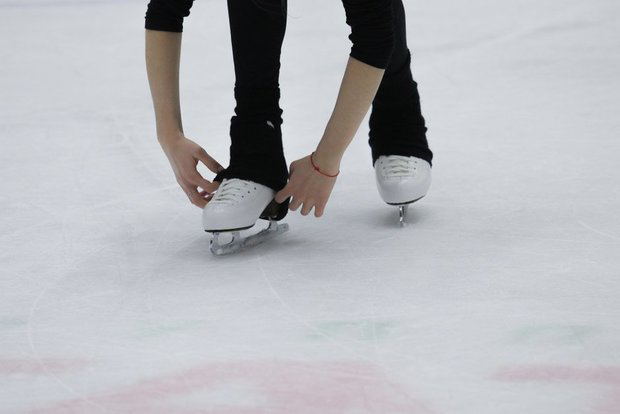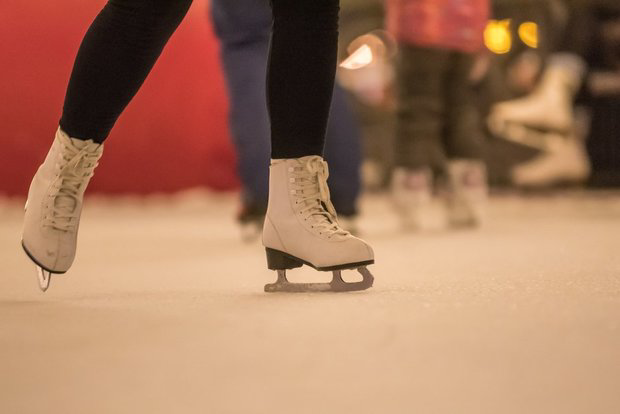Yevgenia Medvedeva as benefactor of Russian sport
Davis and Smolkin claim an Olympic medal
The low season in figure skating turned out to be rich in events: transfers from different federations, break ups of some pairs and the appearance of new duets, Yevgenia Medvedeva’s statement. Read more about it all in a review of Realnoe Vremya’s sports staff.
Davis/Smolkina duet
The debut performance of the ice dance pair Diana Davis and Gleb Smolkin at a pre-season tournament in Lake Placid, US, turned out to be curious in itself because the pair represented Georgia for the first time. Consequently, there was no “pressing authority” of the Russian Figure Skating Federation on judges when giving them points, as it is usually assumed. Secondly, Davis and Smolkin objectively put Maria Kazakova and Georgy Revia to the back seat, they have been the weakest link on the Georgian team until recently — the team is a potential participant in team events at the both 2025 ISF World Team Championship and the Olympic tournament in Milan. Precisely the eighth position of Kazakova and Revia at the team event at the Olympics in Beijing didn’t allow team Georgia to end up in the top 5, because the national team scored the same score as China did — 22.
Clearly, this assumption is coffee reading. Nevertheless, let’s try to have a look at upcoming figure skating team events — at the 2025 World Championship in Japan and the Olympics in Milan in 2026. Nevertheless, Yevgenia Medvedeva has recently claimed that her pre-Olympic visit to Lausanne to the IOC’s behind-closed-doors summit helped Russia to be allowed to compete in team events at the Olympics in Pyeongchang. Medvedeva characterised her speech at the summit as “notable contribution”, as a result, both the ice hockey team won and the figure skaters got a silver.

What does tomorrow hold for us?
So Georgia made a serious transfer by poaching the strongest Russian ice dance pair as of 2023. Yes, after the careers of two leading Russian pairs Sinitsyina and Katsalapov and Stepanova and Bukin “hung up” in the air when they either retired or not, whereas Zagorski and Gureiro certainly retired, Davis and Smolkin became the strongest among competitors. And now they are in Georgia. This country had to solve a problem in the men’s singles because Moris Kvitelashvili is gone too.
The next question is what to do with pairs? There is Luka Berulava with an Olympic experience who changed two partners: pupils of Kazan figure skating Alina Butayeva (they won a bronze of the Youth Olympics) and Tatar girl from Chelyabinsk Karina Safina. The break up of another pair Anastasia Metyolkina and Daniil Parkman allowed the management of Georgian figure skating to easily make up a new duet, but at least another one is need just in case.
Kazan figure skating fans have their own interest because our pupil Inga Gurgenidze (Nikitina) who we can wish patience goes to second position. The age cap rise doesn’t let Gurgenidze to compete earlier than the winter of 2026. Female athletes older than 16 years can start competing as seniors from the next season, girls above 17 can do from 2025 and later. And this means that both the pre-Olympic cycle — the European Championships in Sheffield in 2026 — then, in fact, the Olympics and the World Championship in Prague — all this will bypass Inga.
China to likely fall out of the top 10
France that was recently stable fell out of the team event at the Olympic tournament in Beijing. The problems accumulated in pairs and the ladies’ singles was equalised the French team’s only trump card — the ice dance duet Papadakis and Cizeron. They highly wouldn’t have competed. However, the Frenchmen are doing their best to stabilise figure skating again. For instance, they created a new ice dance pair with Russian Alisa Ovsyankina. Now a threat of missing the top 10 is looming above China because the Celestial Kingdom lost the main asset — pair skating. Single skater Jin Boyang isn’t stable, ladies and ice dance in the country are weakfish.
But China participated in the Olympic final of the team event at home, while Canada, the vice champion in Sochi in 2014, the champion in Pyeongchang in 2018 and finalist of Beijing in 2022, can miss Milan in 2026. Canada also doesn’t have any ace except for ice dance.

At the same time, countries that didn’t earlier reach the team event are demonstrating notable success. It is South Korea (it competed as Olympic host in 2018) that has one of the most stable athletes in singles. Cha Jun-hwan and the ladies’ trio Lee Hae-in, You Young, Kim Cha Youn are guaranteed 16 points after two programmes in the semi-final. Perhaps, even 18. There is a problem with pairs and duets, but before the Olympics at home, Koreans tried to solve this problem by attracting athletes from other countries. This option cannot be ruled out now either because South Korea is considered a candidate for a medal.
South Korea with the Olympic host Italy, Georgia, with powerful US and Japan should fight for medals. However, the South Koreans’ silver at the recent ISF World Team Championship in Japan can only deceive because the competition is based on a different scheme than at an Olympic tournament.
Canada will likely be among competitors, especially if the participation of team Russia is not decided. And now we already see an option with a debut of Switzerland. The men’s tandem Lucas Brichgi and Naoca Rossi, single skater Alexia Paganini and Kimmy Repond — this is a serious application for competition with the same problems as South Korea has, from a perspective of duets and pairs. Curiously, Repond’s choreographer is ex-Czech figure skater David Vincour who also competed for Austria in his career. He was born in Brno in 1984, while ex-hockey player of Ak Bars and Siberia Tomáš Vincour was born in the same city six years later.
Estonians can submit a serious application, they finally have good single skaters, but the prospect of creating any duet will bump into the practically unattainable obstacle. Natalia Zabiyako performed for Estonia first, but her partner Alexander Zaboyev obtained sports citizenship only, not real Estonian citizenship. This is why the athletes couldn’t compete at the Olympics in Sochi. Azerbaijan in this respect would look more promising, but 19-year-old Yekaterina Ryabova retired.
Following the principle of feast or famine, Czechia has a feast in ice dance with the Tasler brother and sister, plus they have world junior champions Mrazek brother and sister. But to compete at the Olympic tournament in Milan, they would need Brezina brother and sister who, sadly, retired.